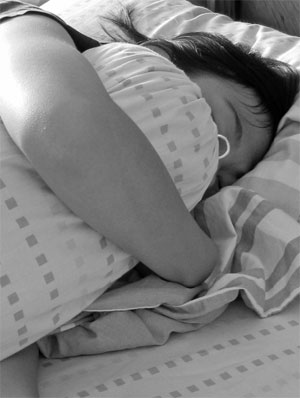ADHD and Sleep Disorders by Jay D. Tarnow, M.D.
ADHD and Sleep DisordersRecently there has been a great deal of media attention on sleep problems in people with ADH D. Sleep problems are rampant in people who have ADHD. However, the big question is whether they are secondary to having ADHD or whether sleep disorders are another cause of ADHD. Th e research on sleep disorders is still in its early stages, especially in children. Th e National Sleep Foundation estimates that 30-40 million Americans have sleep disorders that effect their health and daily functioning. Sleep problems can be a symptom of a disorder (i.e. ADHD, Depression, Anxiety Disorders), a side effect to medication (e.g. stimulants), lifestyle induced (i.e. caff eine, alcohol, obesity), or a primary sleep disorder.
D. Sleep problems are rampant in people who have ADHD. However, the big question is whether they are secondary to having ADHD or whether sleep disorders are another cause of ADHD. Th e research on sleep disorders is still in its early stages, especially in children. Th e National Sleep Foundation estimates that 30-40 million Americans have sleep disorders that effect their health and daily functioning. Sleep problems can be a symptom of a disorder (i.e. ADHD, Depression, Anxiety Disorders), a side effect to medication (e.g. stimulants), lifestyle induced (i.e. caff eine, alcohol, obesity), or a primary sleep disorder.
The big question is whether obstructive sleep apnea, which often times is associated with snoring, can cause ADHD and Learning Disorders. During sleep, the throat muscles relax causing the snoring sound. In obstructed sleep apnea, there is a cessation of breathing between snoring. This reduces the oxygen to the brain and disrupts the sleep cycle. This condition has been shown to cause heart disease, hypertension, depression, brain damage, etc. in adults. However, in children there is increasing evidence that Obstructive Sleep Apnea Syndrome can also have effects on respiration, physical growth, and development. Evidence indicates that in children with Sleep-related Obstructive Breathing Disorder neurocognitive deficits also occur. These include impairments in verbal and non-verbal intelligence, memory, psychomotor efficiency, sustained attention, concentration and psychosocial functioning. Symptoms of hyperactivity, impulsivity, and distractibility, similar to ADHD, have also been reported.
In children, the most common cause of Sleep-related Obstructive Breathing Disorder is upper airway obstruction. This can be classified into three grades of severity: primary snoring (snoring without blood gas abnormality), upper airway resistance syndrome (snoring with increased work of breathing and nocturnal arousal but normal blood gas profile), and Obstructive Sleep Apnea Syndrome (disturbed sleep architecture and snoring associated with abnormal blood gases).
Snoring is commonly reported in childhood. However, only a very small fraction of this group has abnormalities that are of any concern. So what is a parent to do? Evaluation of severe snoring that is associated with apnea (cessation of breathing) by an Ear, Nose, and Th roat specialist may be warranted. Sleep studies are starting to be conducted in certain medical centers in children. The research is still unclear about how to identify the high-risk child, and sleep studies are difficult to perform in children.
Treatment in adults with continuous positive airway pressure (CPAP) results in improvement in symptomatology, particularly excessive daytime sleepiness. To me, this symptom is a warning sign for concern. There are just a few poorly controlled studies that have shown benefit to some children postadrenotonsillectomy (removal of tonsils and adenoids). Obesity is another risk factor for Sleep-related Obstructive Breathing Disorder.
Overall, sleep deprivation can result in mood changes, inattention, delayed reaction time and impaired vigilance, decreased motivation, hyperactivity, aggressive behavior, and impulsivity. These symptoms overlap with those commonly associated with ADHD. Developing good sleep habits and rituals is the key to rule out this etiology. Many people with ADHD have difficulty keeping to a regular bedtime. They get preoccupied with projects, TV, computer games, etc. In addition they have diffi culty calming themselves or settling down. Therefore, teaching children with ADHD how to self-calm and fall asleep is essential. I have used progressive relaxation, abdominal breathing techniques, and selfhypnosis to teach children how to train themselves to fall asleep. Establishing a regular bedtime and bedtime rituals will also facilitate sleep onset. In addition, setting an alarm clock to remind the person to start the bedtime ritual can help them not to get waylaid.
Stimulant medication can sometimes interfere with falling sleep. This is an early side eff ect that usually goes away after a week or two of taking the medication. In some people this side effect can reoccur after drug holidays. Patients need to be instructed not to take their stimulant too late in the day. Some patients have rebound agitation when their stimulants wear off . This rebound is most common with the shorter acting stimulants such as methylphenidate (Ritalin) and Dexedrine. However, the newer long-acting stimulants such as AdderallXR, Concerta, and Metadate, do not seem to cause this problem because they wear off slowly. In rare instances, sleep medications need to be used to help the patient develop a habit of falling asleep using the techniques mentioned above.